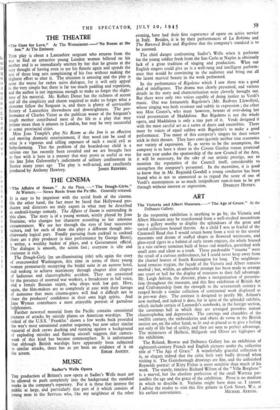MUSIC
Sadler's Wells Opera
THE production of Britten's new opera at Sadler's Wells must not be allowed to push completely into the background the standard works in the company's repertory. For it is these that interest the public at large, and particularly that part of it which consists of young men in the Services who, 1:ke my neighbour of the other
evening, have had their first experience of opera on active service in Italy. Besides, it is by their performances of La Boheme and The Bartered Bride and Rigoletto that the company's standard is to be assessed.
The chief danger confronting Sadler's Wells when it performs for the young soldier fresh from the San Carlo at Naples is obviously lack of a great tradition of singing and production. What our English singers could give us is a well-sung and intelligent perform- ance that would be convincing to the audience and bring out all the latent musical beauty in the work performed.
In the performance of Rigoletto which I saw there was a good deal of intelligence. The drama was clearly presented, and various details in the story and characterisation were cleverly brought out. But there were only two voices capable of doing justice to Verdi's music. One was fortunately Rigoletto's (Mr. Redvers Llewellyn), whose singing was both resonant and subtle in expression ; the other was Miss Coates's, who must however, beware of over-doing her vivid presentation of Maddalena. But Rigoletto is not the whole opera, and Maddalena is only a tiny part of it. Verdi designed it with the most careful art as a series of duets and ensembles. There must be voices of equal calibre with Rigoletto's to make a good performance. Too many of this company's singers let their voices stick in their throats. They have cons!quently neither true resonance nor variety of expression. If, as seems to be the assumption, the company is to have a share in the Covent Garden season promised for next year under the sponsorship of the new Council of the Arts, it will be necessary, for the sake of our artistic prestige, not to mention the reputation of the Council itself, considerably to strengthen the company's personnel. In the meantime, it is good to know that in Mr. Reginald Goodall a young conductor has been found who is not so unmusical as to regard the score of one of Verdi's masterpieces as so much insignificant rum-ti-tum to be got through without interest or expression. DYNELEY HUSSEY.


























 Previous page
Previous page